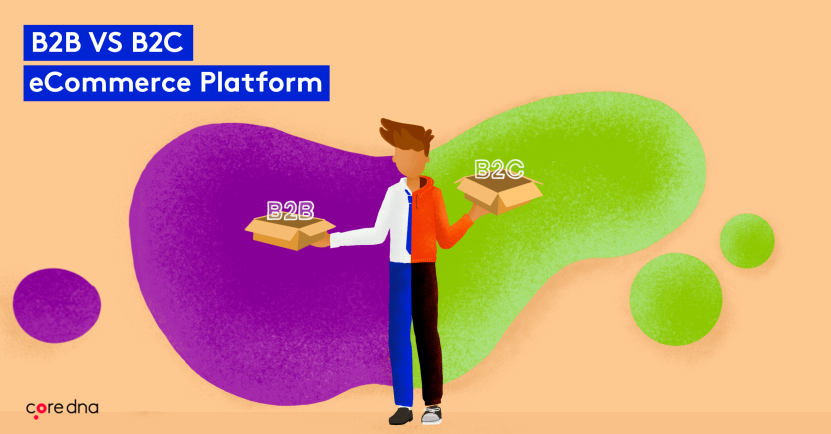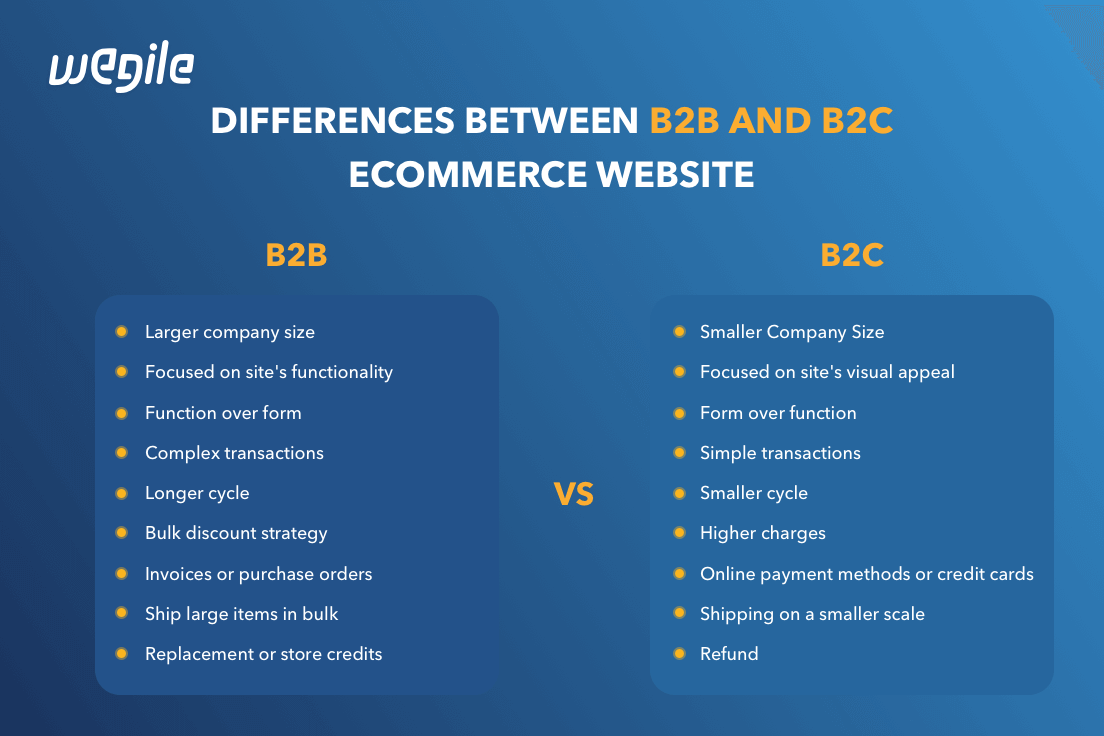B2B And B2C Ecommerce Platform: Boost Sales and Efficiency
B2B and B2C ecommerce platforms serve different business needs. B2B focuses on transactions between businesses, while B2C targets individual consumers.
B2B ecommerce platforms are designed for businesses selling to other businesses. They often feature complex pricing structures, bulk ordering options, and customized user experiences. B2C ecommerce platforms, on the other hand, cater to individual consumers. These platforms emphasize user-friendly interfaces, streamlined checkout processes, and personalized marketing.
Both types of platforms aim to enhance the buying experience, but their features and functionalities vary significantly. Choosing the right platform depends on your target audience and specific business requirements. Understanding the differences helps businesses make informed decisions for their ecommerce strategies.

Credit: www.linkedin.com
Introduction To Ecommerce Platforms
Ecommerce platforms have revolutionized the way businesses operate. They offer a digital space for companies to sell products and services. This transformation benefits both B2B and B2C sectors.
The Rise Of Online Shopping
Online shopping has grown rapidly in recent years. People prefer the convenience of shopping from home. Businesses have noticed this trend and adapted.
According to a Statista report, global ecommerce sales reached $4.28 trillion in 2020. This number is expected to rise in the coming years. The demand for ecommerce platforms is also increasing.
Ecommerce platforms provide various features to enhance user experience. These include:
- User-friendly interface
- Secure payment gateways
- Mobile responsiveness
- Advanced search options
Importance Of Ecommerce
Understanding the importance of ecommerce is crucial for any business. It offers numerous benefits that drive growth and success.
Here are some key reasons why ecommerce is important:
- Global Reach: Businesses can reach customers worldwide.
- Cost-Effective: Reduces operational costs significantly.
- 24/7 Availability: Customers can shop at any time.
- Data Analytics: Provides valuable insights into customer behavior.
A table highlighting the differences between B2B and B2C ecommerce might be helpful:
| Aspect | B2B Ecommerce | B2C Ecommerce |
|---|---|---|
| Target Audience | Businesses | Consumers |
| Order Volume | Large | Small |
| Decision-Making Process | Complex | Simple |
| Sales Cycle | Long | Short |
Both B2B and B2C platforms offer unique advantages. Businesses should choose based on their specific needs and goals.
B2B Vs B2C Ecommerce
Ecommerce platforms are the backbone of online businesses. They can be classified into two main categories: B2B (Business-to-Business) and B2C (Business-to-Consumer). Understanding the differences and unique challenges of each is crucial for businesses aiming to thrive online.
Key Differences
B2B and B2C ecommerce platforms serve different types of customers. B2B platforms cater to businesses, while B2C platforms focus on individual consumers. Here are some key differences:
| Aspect | B2B Ecommerce | B2C Ecommerce |
|---|---|---|
| Customer Type | Businesses | Individuals |
| Order Volume | Large, bulk orders | Small, individual orders |
| Pricing | Negotiable, volume-based | Fixed, retail prices |
| Decision-Making | Long, multi-step | Quick, impulse buys |
Unique Challenges
B2B and B2C ecommerce platforms face unique challenges. These challenges impact how businesses operate and succeed.
- B2B Ecommerce:
- Complex pricing structures: B2B often requires personalized pricing.
- Longer sales cycles: Decisions involve multiple stakeholders.
- Bulk order management: Handling large orders efficiently is crucial.
- B2C Ecommerce:
- High competition: Many businesses compete for consumer attention.
- Customer retention: Keeping customers loyal is challenging.
- Fast shipping expectations: Consumers expect quick delivery.
Understanding these differences and challenges can help businesses choose the right ecommerce platform. It ensures they meet their unique needs effectively.
Choosing The Right Platform
Choosing the right platform is crucial for your eCommerce success. Whether you are in B2B or B2C, the platform you choose can make or break your business. This section will help you understand the key factors and popular platforms to consider.
Factors To Consider
- Scalability: Can the platform grow with your business?
- Customization: Does it offer features to tailor to your needs?
- Integration: Can it integrate with your existing systems?
- Security: Does it provide robust security measures?
- Cost: Is it within your budget?
Popular Platforms
Here are some popular platforms for both B2B and B2C eCommerce:
| Platform | Best For | Key Features |
|---|---|---|
| Shopify | B2C |
|
| Magento | B2B & B2C |
|
| WooCommerce | B2C |
|
| BigCommerce | B2B & B2C |
|
Each platform has its strengths. Choose based on your business needs and goals.
Boosting Sales With Ecommerce
Boosting sales is the ultimate goal for any ecommerce platform. Both B2B and B2C ecommerce platforms can leverage various strategies to achieve this. Let’s explore some effective ways to boost sales.
Effective Marketing Strategies
Effective marketing is essential for driving sales. Here are some proven strategies:
- SEO Optimization: Ensure your product pages rank high on search engines.
- Content Marketing: Create valuable content that attracts your target audience.
- Email Campaigns: Send personalized offers and updates to your subscribers.
- Social Media Marketing: Engage with your audience on platforms like Facebook and Instagram.
- Pay-Per-Click Advertising: Invest in PPC ads to attract immediate traffic.
Personalization Techniques
Personalization can significantly boost customer engagement and sales. Here are some techniques:
- Personalized Recommendations: Use algorithms to suggest products based on user behavior.
- Custom Email Campaigns: Send personalized emails with product suggestions.
- Dynamic Pricing: Offer personalized discounts to loyal customers.
- Personalized Content: Display content that matches the user’s interests.
- Location-Based Offers: Provide offers based on the user’s location.
Implementing these strategies and techniques can help both B2B and B2C ecommerce platforms boost their sales effectively.
Improving Efficiency
Efficiency is crucial for both B2B and B2C eCommerce platforms. Businesses need to optimize operations to save time and resources. This section explores how automation tools and streamlining operations can enhance efficiency.
Automation Tools
Automation tools are game-changers for eCommerce platforms. They handle repetitive tasks, reducing manual efforts. This saves businesses both time and money.
- Inventory Management: Automated systems update stock levels in real time.
- Order Processing: Orders are processed without human intervention.
- Customer Service: Chatbots provide instant responses to common queries.
These tools free up resources for more strategic tasks. Businesses can focus on growth rather than routine operations.
Streamlining Operations
Streamlining operations involves simplifying and optimizing workflows. This ensures smoother processes and faster deliveries.
Here are some ways to streamline:
- Integrated Systems: Connect all business systems to work seamlessly.
- Data Analytics: Use data to identify and eliminate bottlenecks.
- Efficient Supply Chain: Partner with reliable suppliers for timely deliveries.
| Operation | Streamlining Method |
|---|---|
| Order Fulfillment | Automated Picking and Packing |
| Customer Support | AI-Powered Chatbots |
| Inventory Control | Real-Time Tracking |
Streamlined operations lead to faster service and happier customers. This results in higher customer retention and increased sales.

Credit: www.coredna.com
Customer Experience
The customer experience is crucial in both B2B and B2C ecommerce. A great experience can turn visitors into loyal customers. It involves everything from website design to customer support.
User-friendly Design
A user-friendly design ensures ease of navigation. Customers should find products quickly and easily. This involves an intuitive layout, clear categories, and a functional search bar. A responsive design is also essential. It ensures the site works on all devices. A clutter-free interface keeps customers engaged. Use high-quality images and detailed descriptions. They help customers make informed decisions.
Customer Support
Customer support is vital for resolving issues quickly. Offer multiple support channels like chat, email, and phone. A well-trained support team can address customer queries effectively. Provide a comprehensive FAQ section. It can solve common problems instantly. Ensure a quick response time to keep customers satisfied. Regularly update your support resources to stay relevant. Happy customers are more likely to return.
Security And Compliance
Security and compliance are crucial for both B2B and B2C ecommerce platforms. They ensure data safety and adherence to laws. This section will discuss key aspects like data protection and regulatory requirements.
Data Protection
Data protection involves safeguarding customer information. Sensitive data includes names, addresses, and payment details. Ecommerce platforms must use strong encryption. Encryption converts data into a secure format. Only authorized users can read encrypted data.
Firewalls and antivirus software are essential. They protect against unauthorized access and malware. Regular security audits help identify vulnerabilities. Two-factor authentication (2FA) adds an extra layer of security. Customers receive a code on their phone. They enter this code along with their password.
Regulatory Requirements
Regulatory requirements ensure compliance with laws. Laws vary by region and industry. The General Data Protection Regulation (GDPR) applies to European customers. It mandates strict data protection rules. Non-compliance can result in hefty fines.
In the United States, the California Consumer Privacy Act (CCPA) is important. It gives consumers more control over their personal information. Businesses must disclose what data they collect and how they use it.
Adhering to these regulations builds trust. Customers feel safer when they know their data is protected. Below is a table summarizing key regulations:
| Region | Regulation | Key Points |
|---|---|---|
| Europe | GDPR | Strict data protection, heavy fines for non-compliance |
| United States | CCPA | Consumer data control, disclosure of data usage |
Maintaining compliance and protecting data are ongoing processes. Regular updates and training are necessary. This ensures that all staff and systems stay secure and compliant.
Future Trends In Ecommerce
The world of ecommerce is rapidly evolving. Both B2B and B2C ecommerce platforms are experiencing significant changes. These changes are driven by technological advancements and consumer expectations. Let’s delve into the future trends shaping ecommerce.
Ai And Machine Learning
AI and Machine Learning are revolutionizing ecommerce. They help businesses understand customer behavior better. Companies use AI for personalized recommendations. This increases sales and enhances the shopping experience.
Machine learning helps in predicting trends. It enables businesses to stock popular products. AI chatbots provide instant customer support, reducing waiting times. These technologies streamline operations and improve efficiency.
Sustainability
Sustainability is becoming crucial in ecommerce. Consumers prefer eco-friendly products. Companies are adopting sustainable practices to meet this demand. They use recyclable packaging and reduce carbon footprints.
Businesses are also focusing on ethical sourcing. They ensure fair labor practices and use environmentally friendly materials. Sustainability not only helps the planet but also attracts conscious consumers. This trend is set to grow in the coming years.

Credit: wegile.com
Frequently Asked Questions
What Is The Difference Between B2b And B2c Ecommerce?
B2B ecommerce involves transactions between businesses. B2C ecommerce deals with transactions between businesses and consumers. B2B usually features bulk orders and long-term relationships. B2C often focuses on individual purchases and customer experience.
Why Choose A B2b Ecommerce Platform?
A B2B ecommerce platform streamlines bulk orders and manages complex pricing. It enhances business relationships and automates processes. This results in increased efficiency and reduced costs.
What Features Should A B2c Ecommerce Platform Have?
A B2C ecommerce platform should have user-friendly navigation. It needs robust search functionality and secure payment options. It should also offer personalized recommendations and mobile responsiveness.
How Can Ecommerce Platforms Boost Sales?
Ecommerce platforms boost sales through targeted marketing and personalized experiences. They offer seamless navigation and secure payment options. Automation and data analytics also play a crucial role.
Conclusion
Choosing the right ecommerce platform can transform your business. B2B and B2C platforms offer distinct advantages. Assess your specific needs and goals. Invest in a solution that supports growth, enhances user experience, and drives sales. Stay competitive by leveraging the right tools and strategies for your ecommerce success.






